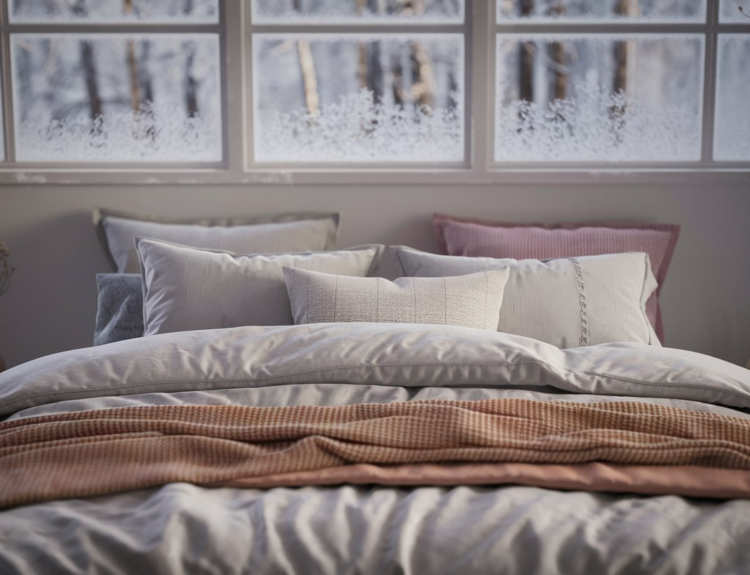Are you one of those individuals who ponder the age-old question, “Should I sleep with my window open?” The decision to welcome the night air into your bedroom has sparked debates for generations. We’ll explore the pros and cons of this practice, equipping you with the knowledge to make the right decision that aligns with your preferences and requirements.
Should I sleep with my window open? Discover the pros and cons of this practice and make the right decision for a better night’s sleep.
In this article:
- Should I sleep with my window open? Advantages
- Should I sleep with my window open? Disadvantages
- Does sleeping with a window open make you sick?
- Should I sleep with my window open in winter?
- Alternatives to sleeping with open windows
SHOULD I SLEEP WITH MY WINDOW OPEN? ADVANTAGES
Questions like “Should I sleep with my window open?” often spark considerations. This practice presents numerous advantages that can significantly enhance the quality of your sleep experience.
- Improved air quality – One of the key benefits of sleeping with your window open is inviting fresh outdoor air into your sleeping space. It can be particularly refreshing if your room feels stuffy or lacks proper ventilation. The influx of oxygen-rich air can help reduce indoor pollutants, ensuring a cleaner, healthier atmosphere for breathing while you sleep.
- Better temperature regulation – Sleeping in a room with a comfortable temperature is essential for quality rest. Opening your window can provide natural ventilation, helping to regulate room temperature, especially during hot summer nights. It can eliminate excessive air conditioning, potentially saving energy costs.
- Natural soundscape – There’s something inherently soothing about the sounds of nature. Sleeping with your window open lets you enjoy a natural soundscape of chirping birds, rustling leaves, and distant crickets. For many, these calming sounds can lull them into a peaceful slumber, creating a tranquil sleeping environment.
- Psychological comfort – The fresh air on your skin and the ability to see the night sky can offer a sense of freedom and connection to the outside world. This psychological comfort can reduce stress and anxiety, promoting a more relaxed state of mind conducive to a deeper sleep.
However, it’s essential to acknowledge that this practice also has potential drawbacks, which we will explore in the next section.
SHOULD I SLEEP WITH MY WINDOW OPEN? DISADVANTAGES
Here are some drawbacks to keep in mind:
- Allergens and pollutants – Opening your window can invite outdoor allergens like pollen and dust into your bedroom. It can trigger discomfort and worsen symptoms for individuals with allergies or respiratory sensitivities. Additionally, outdoor pollutants, such as vehicles or industrial emissions, can find their way inside, potentially impacting indoor air quality.
- Noise disturbances – Depending on your location, leaving your window open at night can expose you to unwanted noise disturbances. Traffic sounds, barking dogs, and other environmental noises may disrupt your sleep, making it challenging to achieve a restful night.
- Security concerns – An open window can invite intruders. While the fresh air is appealing, it’s crucial to prioritize your safety and the security of your home.
- Insects – Leaving your window open can also invite unwanted insects into your sleeping space. Mosquitoes flies, and moths may find their way in, potentially causing discomfort and the risk of insect bites.
- Weather considerations – Depending on the weather conditions in your area, sleeping with your window open can sometimes be impractical. An open window may not be the most comfortable or energy-efficient choice during extreme heat, cold, or inclement weather.
The answer to the question “Should I sleep with my window open?” is that it has many advantages; still, it’s also essential to be aware of the potential disadvantages. Considering both, you can make a decision that aligns with your circumstances.
DOES SLEEPING WITH A WINDOW OPEN MAKE YOU SICK?
The concern that sleeping with a window open might make you sick is valid, especially for individuals with specific health conditions.
Sleeping with a window open can introduce outdoor allergens like pollen and dust into the sleeping environment. For individuals with environmental allergies or respiratory sensitivities, this can trigger allergic reactions or exacerbate existing respiratory issues, leading to symptoms such as sneezing, congestion, and coughing.
In addition to allergens, open windows can allow outdoor pollutants to enter your bedroom. It may include vehicle emissions, industrial sites, or other environmental sources. Exposure to these airborne irritants can adversely affect respiratory health, particularly for individuals with preexisting conditions like asthma.
Sleeping with a window open during extremely cold or hot weather can expose you to temperature extremes that might lead to discomfort or illness. Prolonged exposure to cold drafts can lower your body temperature, potentially increasing the risk of colds or respiratory infections. Similarly, excessive heat can disrupt your sleep and impact your overall well-being.
The impact of sleeping with a window open may vary by season. While it can be refreshing in mild weather, it might not be as advisable during peak allergy seasons or extreme weather conditions.
Your tolerance for temperature, allergens, and other factors plays a significant role. Some individuals may be more resilient to environmental changes, while others may be more susceptible to getting sick. So, when considering “Should I sleep with my window open?” it’s crucial to weigh the potential benefits against the risks.
SHOULD I SLEEP WITH MY WINDOW OPEN IN WINTER?
Embracing a bit of winter breeze can bring some perks. It can refresh your living space, making it less stuffy. Additionally, enjoying the crisp winter air can be refreshing and conducive to a good night’s sleep.
To enjoy the benefits of fresh air without making your room uncomfortable, opening your window for a short period, such as 15-30 minutes, before bedtime is generally advisable. Pay attention to the outdoor temperature. If it’s freezing, keep the window open shorter to prevent your room from becoming too chilly.
The quality of insulation in your room plays a crucial role. Well-insulated rooms will retain heat better and allow longer window openings without a significant temperature drop.
Ensure you have warm and suitable bedding, such as heavy blankets and warm pajamas, to keep you comfortable while the window opens.
Listen to your body. If you feel uncomfortably cold or notice a significant drop in room temperature, closing the window sooner is best. Always prioritize your health.
ALTERNATIVES TO SLEEPING WITH OPEN WINDOWS
If your response to the question, ‘Should I sleep with my window open?’ is final no, rest assured that there are several viable alternatives to consider.
- Air purifiers: Air purifiers can be valuable to your bedroom. They remove allergens, pollutants, and odors from the air, ensuring you breathe clean and fresh air without opening a window. Look for those with HEPA filters for optimal results.
- Ventilation systems: Consider installing a ventilation system if you’re concerned about indoor air quality. Mechanical ventilation systems help circulate and filter indoor air, ensuring a constant supply of fresh air without opening windows.
- Climate control: Modern climate control systems, such as air conditioning and central heating, allow you to maintain a comfortable room temperature year-round. By setting your thermostat to your preferred sleeping temperature, you can sleep soundly without needing to open a window for temperature regulation.
- Dehumidifiers: Dehumidifiers can be beneficial, especially in humid climates. Removing excess moisture from the air creates a more comfortable sleeping environment and reduces the risk of mold and mildew growth.
- Use fans: Ceiling and oscillating fans can help improve air circulation in your room, making it feel fresher. Fans can also help regulate room temperature by evenly distributing warm or cool air.
To discover more sleep tips, visit the articles in our “Sleep” category.
_____
Should I sleep with my window open? The decision is personal, and it comes with advantages and disadvantages. Whether you choose fresh night air or alternative methods to enhance your sleep environment, the key is to prioritize your comfort and well-being. Sweet dreams!
This post may contain affiliate links. You can read the affiliate disclosure here.










